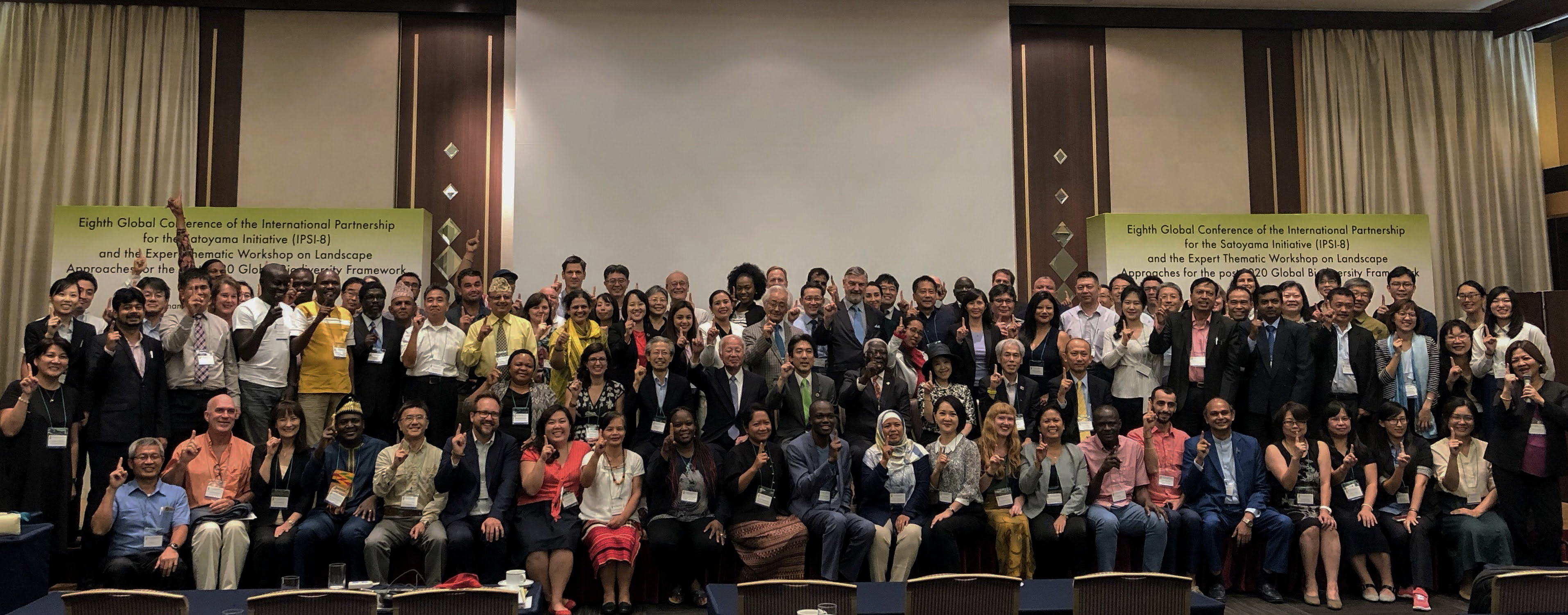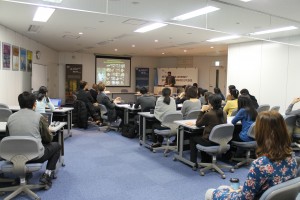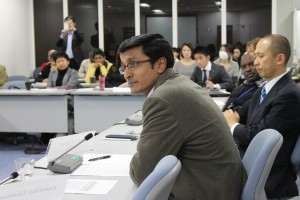Dr. Anil Kumar, Director of the Community Agro-biodiversity Centre of the M S Swaminathan Research Foundation, a member of the IPSI Steering Committee, gave a lecture on “Community Management of Agro-biodiversity for Food and Agriculture in India” at the United Nations University Institute of Advanced Studies (UNU-IAS) on 18 December 2012.
In his presentation, Dr. Kumar first reviewed global and national efforts in biodiversity conservation. He mentioned that one of the key outcomes of the CBD-COP11 was to mobilize funds to achieve the 2020 Aichi Biodiversity Targets, and to integrate National Biodiversity Strategies and Action Plans (NBSAPs) with national biodiversity targets and the 2020 Targets. The achievement of the 2020 Targets would require contributions not only from scientists and policymakers but also from the majority the society especially local communities. In India, biodiversity management integrates efforts from five dimensions: legal, economic, science & technological, social & behavioural, as well as cognitive. Under the Biodiversity Act 2002, a three-tier management system was established, which includes the National Biodiversity Authority, State Biodiversity Broads and local level Biodiversity Management Committees. Laws and regulations such as the Protection of Plant Varieties and Farmers’ Rights Act (2001) and the Forest Rights Act (2005) promote agro-biodiversity and sustainable use of natural resources, and protect ethnic/tribal communities’ rights to use forest resources. The National Rural Livelihood Mission and the National Rural Employment Guarantee Scheme aim to lift farmers out of poverty and develop their skills in sustainable resource management.
Dr. Kumar then explained the importance of community management approach for improving food security and agro-biodiversity. FAO estimates that of a total of 300,000 plant species, only 150-200 species have been commercially cultivated for human food. As a result, crop diversity has significantly declined along with the loss of relevant traditional knowledge. However, many of the neglected crops offer important genes to cope with climate change, e.g., deepwater rice that can survive floods and Faidherbia albida trees that can improve soil productivity. They also form part of the territorial carbon banks to help mitigate climate change. As such, more efforts need to be made to promote the cultivation of sustainable species. Local community management can contribute to agro-biodiversity and food security through four integrated activities: the nurturing, preserving and enhancing of genetic resources, the conversion of genetic resources into useable goods and services, equitable sharing of products and resources, and sustainable consumption of these goods and services.
The MSSRF adopts a participatory and trans-disciplinary approach to revitalising community conservation systems. Dr. Kumar introduced two case studies to illustrate such efforts. One is the study and promotion of food plant diversity in Chaliyar and Kabani Watershed areas in Wayanad District, Kerala. The areas are rich in agro-biodiversity, but local communities are under market pressure to change the patterns of production and types of products to grow. One of the key questions the MSSRF seeks to address is whether food plant diversity can be scaled for commercial use while maintaining biodiversity and ecosystems and improving human health. Another case study is about the below-sea level farming system in Kuttanad, which is known as the “rice bowl of Kerala” and has been recognized as a GIAHS site. Due to the lack of fresh water, Kuttanad is also known as a “water desert” and is facing other challenges such as pollution, urban encroachment, land reclamation and the use of fertilizers and pesticides. The MSSRF is working with local communities to revitalize the agricultural heritage of Kuttanad, which will help in achieving some relevant Aichi Targets.
Dr. Kumar concluded his presentation by highlighting the MSSRF’s 4C framework of biodiversity management, which includes cultivation, conservation, commerce and consumption, and how it can contribute to the objectives of the Satoyama Initiative. Finally, he stressed the importance of local actions in realizing the vision of living in harmony with nature.
Following Dr. Kumar’s presentation, Dr. Manu Mathai (research fellow, UNU-IAS) discussed the loss of agro-biodiversity in the context of agrarian crisis and how we should avoid museumization of socio-ecological production landscapes and seascapes (SEPLS) with the trends of globalization and urbanization.
In the Q&A session, a lively discussion took place with the participation of researchers from UNU-IAS, NGOs and other organizations.
To watch archived video and photo gallery, please click here.






